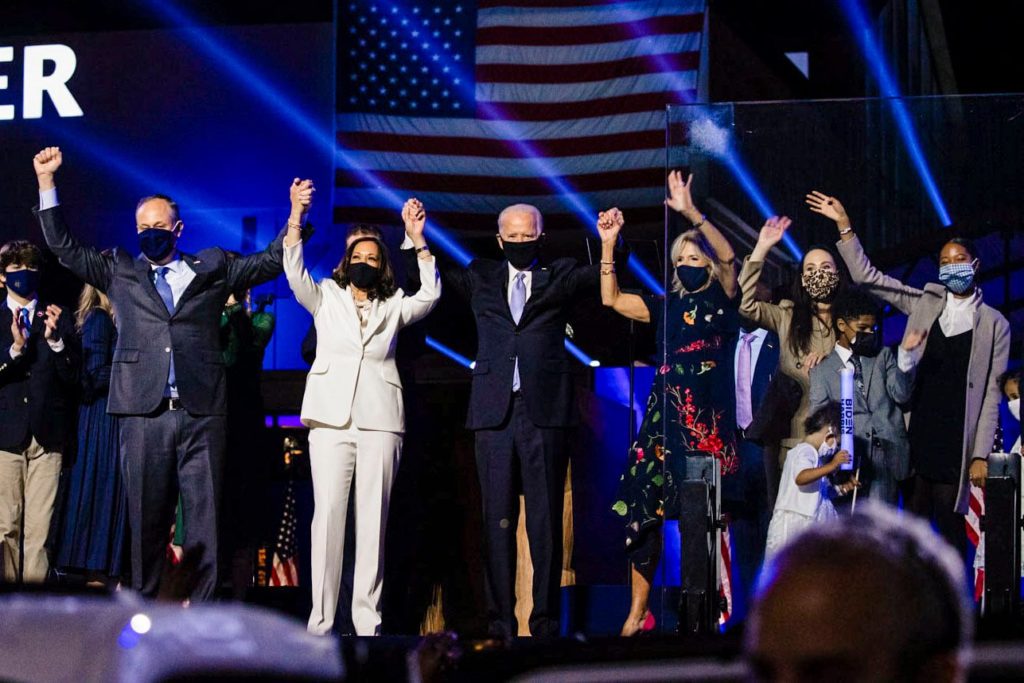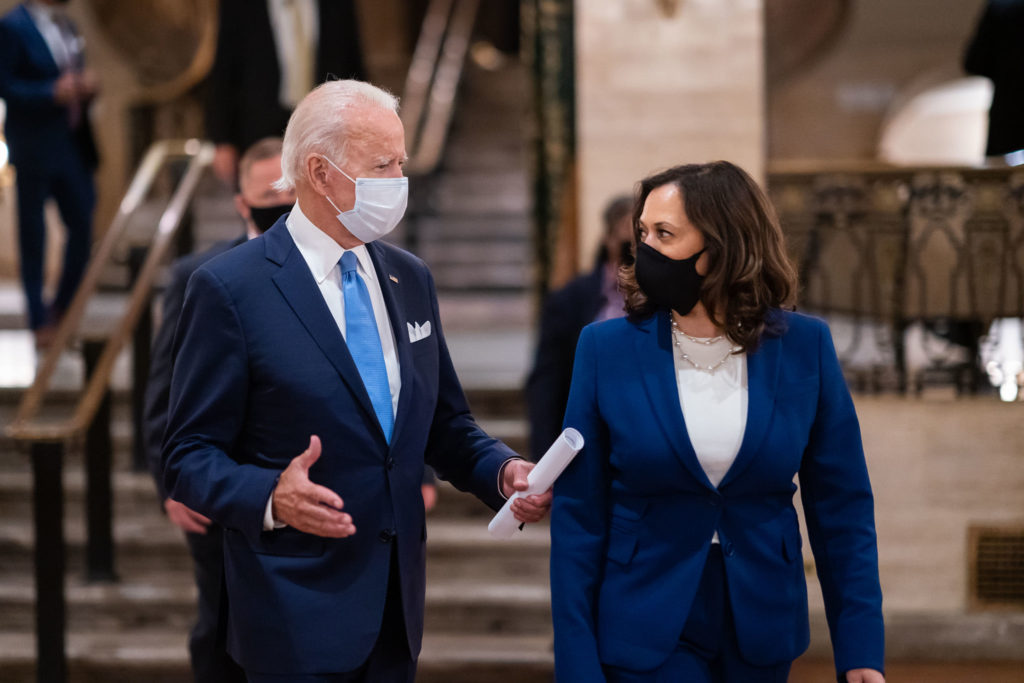3299 people reached on FB Lassi with Lavina page – 76 engagements – FB insights

Biden beats Trump in a Roller-Coaster Election
Kamala Harris becomes America’s First Female Vice President
[dropcap]N[/dropcap]ovember 7 was an unbelievable day in America. Today the US presidential election, after a nail-biting vote count, was finally called for Vice President Joe Biden as he reached the magic number of 270 electoral votes needed to be declared president. He and Senator Kamala Harris, who is now vice-president elect, plan to usher in a very different America from the dystopian Trump world of the last four years.
As the news channels broke the news, there was joyous cheering and dancing in the streets, an endless honking of horns – the new form of applause – with people clapping and celebrating. This past week Indian-Americans, along with all other Americans have been on a wild roller coast ride in a sharply divided country.
The US election took place in the midst of the pandemic and the world has been riveted by the razor thin margin between the two candidates. The Democrats voted overwhelmingly by mail-in ballots because of Covid-19, while Republicans had generally voted in person. So the votes are still being counted though Biden has surpassed the number needed for the Electoral College and has also won the popular vote. Trump has yet to concede, has tweeted about ‘fraud’ and ‘stolen elections’ and has launched several legal cases.
Meanwhile, Biden and Harris are busy with the transition and have launched ambitious policies to deal with the raging pandemic and the failing economy. Joe Biden, the consummate politician and Caregiver-in-chief is bringing diverse populations together from seniors to millennials, from Hindu Americans to Muslim Americans to LGBTQ, and every community from black to white and Latino.
[dropcap]W[/dropcap]omen everywhere have been delighted that Kamala Harris, the daughter of immigrants, becomes the first female vice-president and also the first Indian and black woman to hold this second-highest position in America. As Biden said, in introducing his ‘fantastic’ vice president, “
Harris, in her speech invoked her Indian mother, Shyamala Gopalan as well as all the black women who had come before her and had inspired her. She said, “To the American people—no matter who you voted for—I will strive to be a Vice President like Joe Biden was to President Barack Obama: loyal, honest, and prepared, waking up every day thinking of you and your families.”
She added a special message for all the young people, “Every little girl watching tonight sees that this is a country of possibilities. And to the children of our country, regardless of your gender, our country has sent you a clear message – dream with ambition, lead with conviction and see yourselves in a way that others may not simply because they’ve never seen it before, but know that we will applaud you every step of the way.”
Neera Tanden, president of the Center for American Progress, says: “I’ve been in politics a while now, and I never thought I would see in my lifetime the daughter of an Indian immigrant in the White House as the vice president. It’s just breathtaking and she inspired so many people to get involved in politics for the first time. If you look at what happened in Georgia, the turnout of Indian Americans in the suburbs went through the roof. And I think that’s in large part because of Kamala and this ticket.”
While Kamala Harris is a shining testament to what Indian-Americans can achieve in America, there are many who are making a mark in the political life of the country and are now part of the mainstream when it comes to participating in the civic life of the country, as candidates, as advocates and activists and as voters. There was much more active participation from Indian-Americans across the spectrum. In fact, over 70 Indian-Americans ran for office up and down the ballot. The big news was that all four US Representatives in the US Congress – Ami Bera, Pramila Jaypal, Raja Krishnamoorthi and Ro Khanna- all handily won their re-elections.

[dropcap]O[/dropcap]ther Indian-American candidates who won their races include Jenifer Rajkumar (NY, State Assembly District 38), Nima Kulkarni (KY State House, HD-40) Kesha Ram (VT, State Senate) Nikil Saval (PA, State Senate) Jeremy Cooney (NY, State Senate, SD-56), Vandana Slatter (WA, State House District 48), Padma Kuppa (MI, State House 41), Jay Chaudhuri (NC, State Senate), Ravi Sandill (TX, 127th District Court Judge), Amish Shah (U.S., State House AZ-24), and Ranjeev Puri (MI State House, District 21),
Seema Nanda, Visiting Fellow, Harvard Law School Labor and Worklife Program, and former CEO, Democratic National Committee, says she’s seen a massive surge in political awareness and activism in the community which has doubled in numbers since the year 2000.
“One of the fascinating things that I saw in leading the Democratic Party was just so many grassroots groups of Indian Americans with a lot of women doing the work on the ground. And if you talk to a lot of these folks, they didn’t do any of this before 2016 so the election of Trump was a mobilizing moment for the Indian-American community.”
Indeed, according to AAPI, Asian Americans are the fastest-growing racial or ethnic voting bloc in the country. It was projected that there would be 4 million Indian American voters in this year’s election, with nearly 500,000 Indian American voters in the battleground states of Florida, Pennsylvania, and Michigan.
Neha Dewan, National Director of South Asians for Biden, noted “Early indications are that our diverse South Asian community played a pivotal role in this victory by not only voting in unprecedented numbers, but also by undertaking the work of organizing the community to make this outcome more likely.That the Biden-Harris ticket unseated an incumbent president is a historic feat and represents a convincing repudiation of President Trump and his abhorrent worldview.”
There are scores of South Asian groups which supported the Biden-Harris ticket: AAPI (Asian American Pacific Islanders) Indiaspora, AAPI Victory Fund, Indian American Impact Fund and South Asians for Biden, and Indian National Council for Biden.There are grassroots groups like Sikh Americans for Biden, Muslim Voter outreach, TheySeeBlue, US-India Friendshp Council, South Asian Americans for Voter Education +Engagement +Empowerment (SAAVE) and South Asians of Michigan Organizing for Serious Action (SAMOSA). This abundance of groups has resulted in advocacy and phone banking in battleground states.
In 2020, IMPACT, a political organization, raised a record $10 million which doubled turnout of South Asian voters in critical states, including Pennsylvania and Arizona. Neal Makhija, director of IMPACT points out that Harris’s election “sends a message to a new generation of young black and brown children that they belong, and that in America, anything is possible. Her election will supercharge the political engagement of the Indian American community”
(This was first published in my weekly column India in America in CNBCTV18.com)

